Spring Honors 2020
While the department traditionally celebrates Honors Day as the final colloquium of the spring semester, the 2020 festivities were cancelled due to COVID-19. That didn't mean, however, that the department didn't recognize outstanding students (and faculty) with our annual awards. These awardees made a positive impression with their dedication to academics, outreach, research, and service to the physics department, and we hope to honor them in person when possible.
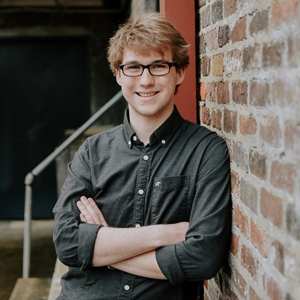 Outstanding First Year Student: Lucas McBee
Outstanding First Year Student: Lucas McBee
This award recognizes exceptional achievement by a student in his or her first year of physics study. The faculty selects this honoree based on academic excellence and scholarly potential. Lucas is a graduate of Cascade High School in Bell Buckle, Tennessee, and a recipient of the Bill Bugg Physics Faculty scholarship. His nomination reads that in his Honors Fundamentals of Physics course, he excelled in all aspects and "even more importantly, through (his) numerous questions he (showed) a profound understanding of the course material as well as questioning the limitations of what we can cover in an introductory course."
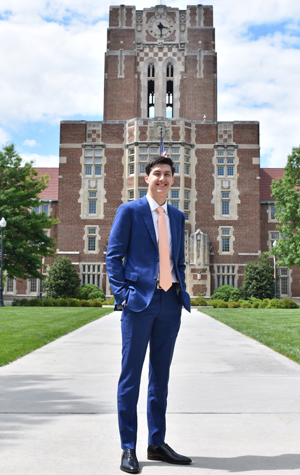 Robert Talley Award for Outstanding Undergraduate Research: Ian Cox
Robert Talley Award for Outstanding Undergraduate Research: Ian Cox
This award goes to an undergraduate student who has excelled based on research acumen and a demonstrated penchant for solving problems through physics theory and experimentation. Ian, who began his studies in 2016 with the Bill Bugg Faculty Scholarship, has been working with Professor Robert Grzywacz’s group for more than two years. In that time, Professor Grzywacz writes that Ian "has shown an incredible commitment to research and has very quickly acquired skills necessary to be an equal participant in our experimental activities."
In 2018 the group performed a high-profile experiment at the RIKEN facility in Japan on studies of decay of a doubly-magic isotope of 78Ni and its neighbors. Ian participated in every step of the experiment preparation both at UT and in Japan. His senior year he helped the group prepare for another experiment, and because of his experience, he was entrusted to lead the key proof-of-principle detector tests necessary for this research. Professor Grzywacz has said that Ian has been an excellent ambassador for the University of Tennessee in international collaborations.
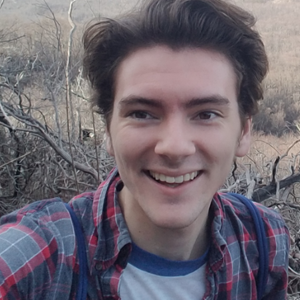 Robert Talley Award for Outstanding Undergraduate Leadership:
Robert Talley Award for Outstanding Undergraduate Leadership:
Lucas McClure
This honor goes to the undergraduate who has made the most significant contributions to the department outside the classroom. This student is one who volunteers both time and talent to pursuits that promote a positive image of the department, add depth to its programs, and encourage interest in the field. Lucas was recognized for his leadership as president of the Society of Physics Students and especially for his efforts to reinvigorate the club and make it more inclusive. New events have included Facul-Tea time, more integration with the graduate students, and the establishment of a new constitution/voting rules for the club in order to increase transparency and build a positive environment for undergraduate physics majors. SPS also sponsored a fluorescence demo at the library last Halloween, and helped promote the physics department at Engineers Day. Despite the COVID-19 quarantine, SPS managed to continue meeting via Zoom and supporting a happy departmental environment. Lucas has also helped with outreach at The Muse Knoxville science museum.
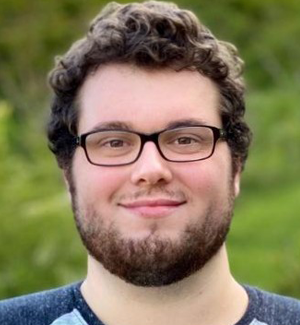

James W. McConnell Award for Academic Excellence: John (Jack) Roberts and David Pochik
This honor recognizes undergraduate physics majors who have senior standing and who have demonstrated outstanding performance in academic coursework. Both Jack and David had stellar nominations for this award.
Jack (above left) proved himself in the Modern Physics Laboratory with his strengths both in experimental techniques and the physics concepts that underpin the experiments covered in the course. He has worked on computational astrophysics research where he learned computer programming.
David (above right) likewise has strong academic credentials and also made solid contributions to the department’s supernova research group, where his nominating professor ranked him among the top three undergraduate students who have ever worked with their group.
 Douglas V. Roseberry Award: Christal Martin
Douglas V. Roseberry Award: Christal Martin
The Douglas V. Roseberry Award recognizes an upper-level student who exemplifies the attributes of Douglas Roseberry, an undergraduate physics major at UT in the late 1950s. Douglas was an energetic student with a penchant for physics and a great enthusiasm for participation in departmental activities. A member of Phi Beta Kappa, he was described by former department head Alvin Nielsen as "clearly the epitome of what a fine student should be." Douglas was active in undergraduate research and planned to pursue graduate study at Princeton University when an aneurysm claimed his life in October 1959. In the spring of 1960, the department awarded the first Douglas V. Roseberry Award to honor the young scholar and recognize another student of like qualities, including department participation and exceptional academic performance.
Christal was recognized for this top undergraduate honor for the many contributions she has made to the department as an undergraduate. She has been a leader both in and outside the classroom. Her nominating professor wrote that she "is one of the most diligent workers I have in class. She does every homework, starts well in advance, and asks questions if she doesn’t know where to start. She also marshals all of her classmates to get them doing their homework in a timely manner. She is the ringleader of an inclusive group of students who study together. She is one of the students I go to when I have a student I’m worried about and would like to be more included. I cannot overstate how valuable it is to have a student like her in our department."
Christal also has research experience in nuclear physics and presented her work at the 2019 American Physical Society Division of Nuclear Physics meeting, having won a fellowship from the APS to support her attendance. Her nominating professor sums up how Christal meets the criteria for the Roseberry Award as such:
"She regularly takes the initiative to reach out to struggling students and make sure they are okay. She is a social center in the department, entirely in a good way. When I want to know what’s going on in the department among the students, I can ask her. She is a role model in the department for our other students. I think this really captures the essence of what the Roseberry Award is supposed to be about."
 Robert W. Lide Citation: Tara Skiba
Robert W. Lide Citation: Tara Skiba
The Robert W. Lide Citations recognize students who have made exceptional specific contributions to the undergraduate instructional laboratories. Dr. Lide served on the physics faculty from 1957 until his retirement in 1992. For many years he was responsible for the nuclear physics laboratory before taking on the general undergraduate laboratories. After retiring he continued to organize the undergraduate instructional labs and the weekly equipment setup. His spirit of exceptional service to the labs inspired these citations for students who make similar contributions.
As her nomination explains, Tara has been a tremendous help this past year in repairing equipment, testing new lab material, making new devices for labs, and setting up equipment as needed. And she has done everything with a cheerful attitude.
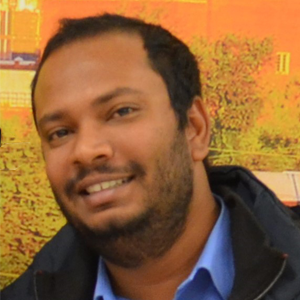
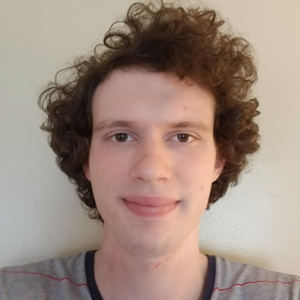
Outstanding GTA Award: Namila Liyanage and Logan Hoskins
The graduate teaching assistant who earns the highest rating from laboratory students wins this award. For 2020 the department honored two GTAs with this award: Namila Liyanage and Logan Hoskins.
Namila (above left) has been a GTA for both studio labs and traditional labs and has excelled as a GTA with both formats. One of Namila’s students says this about him: "As a teaching assistant he proves on a daily basis he is very knowledgeable and is very interested on how his students are doing and making sure that we not only complete all required work, but we understand how to do it."
Logan (above right) has been a GTA for Physics 231 and this past year for Physics 361. His students say this about him: "He goes above and beyond for us in a way that I have never seen a TA do before,” and, “to be honest you have to be the best TA that I have had for a physics class. You really care about our learning and would go over and beyond to help us."
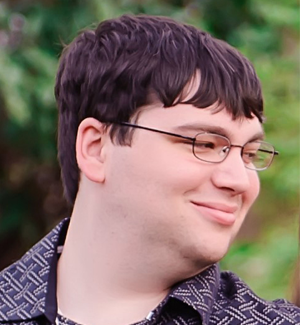 James E. Parks Award: Andrew Shore
James E. Parks Award: Andrew Shore
Established in 2015 by Physics Alumnus Richard Manley and his wife, Melissa, the James E. Parks Award recognizes a student who shares Dr. James Parks’ commitment to hands-on, innovative physics teaching in a laboratory setting. Dr. Parks earned a BS in physics from Berea College, a master’s in physics from UT, and a PhD from the University of Kentucky. He taught at Berea College and was a full professor at Western Kentucky University, served as technical director for Atom Sciences in Oak Ridge, and directed UT’s Institute for Resonance Ionization Spectroscopy. In 1993 he became director of the UT Physics undergraduate laboratories, retiring in 2016.
Andrew's citation for this award from Undergraduate Lab Director Christine Cheney reads: "Andrew has given a lot of thought and effort to his students in Physics 137 and Physics 138 labs. He cares about their learning and challenges them to excel in their understanding of experimental physics. Andrew, thank you for your dedication to teaching!"
Paul H. Stelson Fellowships
Dr. Paul H. Stelson earned his BS and MS degrees from Purdue University and a PhD at age 23 from the Massachusetts Institute of Technology. He joined Oak Ridge National Laboratory in 1953 as a nuclear physicist. In 1973 he was appointed Director of the Physics Division. During his tenure as director, the Holifield Heavy-ion Research Facility was funded, built, and became operational. He especially enjoyed interacting with young physicists, serving as an adjunct professor in the physics department from 1967 until his death in 1992. His family established the Stelson Fellowships in his memory to assist aspiring physicists in completing their education and to continue the fruitful interactions in physics between UT and ORNL. Two honors are presented: one for beginning research and a second for professional promise.
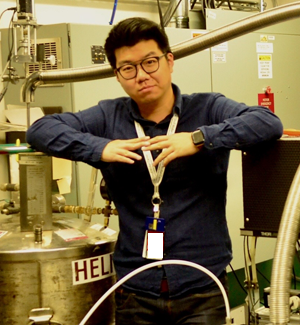 Paul H. Stelson Fellowship for Beginning Research: Xin Wen
Paul H. Stelson Fellowship for Beginning Research: Xin Wen
Xin is recognized for demonstrating exceptional promise in networking science and technical colleagues to achieve success with a complex experimental problem. He is a fourth-year PhD student whose thesis involves using neutron beams to create Helium excimer molecules that when illuminated with laser light fluoresce in the visible spectrum. By capturing the fluorescence in a movie, he aims to track turbulent flow around objects. The data will be used to improve computational models of flow with colleagues at the UT-ORNL Joint Institute for Computational Studies. The project requires integration of sophisticated equipment (Class IV lasers, neutrons beams, fast cameras, pumped liquid Helium, etc.) and skills of a diverse group of technicians. Xin’s nominating professor wrote that his "extraordinary professional promise is demonstrated by his ability to network people in three organizations (UT, Florida State University and Oak Ridge National Laboratory) to achieve results." Xin’s first paper as a PhD student was recently accepted by Physical Review Letters as an Editors Suggestion.
 Paul H. Stelson Fellowship for for Professional Promise: Josh Barrow
Paul H. Stelson Fellowship for for Professional Promise: Josh Barrow
Josh is currently based at Fermilab working with the DUNE collaboration to further develop the physics models and simulation frameworks of intranuclear neutron-antineutron transformations and associated atmospheric neutrino backgrounds; he also works within the GENIE collaboration on electron scattering validation of event generator predictions for better future neutrino physics predictions. His nomination reads that "he functions practically as (an) independent researcher pursuing his own ideas and organizing small international collaborations and working groups of theoreticians and experimentalists." In the past two years Josh has represented DUNE and his UT research group at several US and international conferences and workshops, and is becoming recognized in the community as one of many active young leaders within the DUNE collaboration. He is the (leading) coauthor of four peer-reviewed papers and proceeding written by he and his colleagues without the direct participation of his UT adviser. In 2018 Josh won an Office of Science Graduate Student Research (SCGSR) Program fellowship from the Department of Energy, and in 2019 he won a Visiting Scholars Program fellowship from the Universities Research Association, both with yearlong appointments to Fermilab. He is also currently co-organizing and virtualizing a Amherst Center for Fundamental Interactions Workshop on "Prospects for Baryon Number Violation by Two Units," to take place remotely in late summer in preparation for the APS DPF Snowmass 2021 Process.
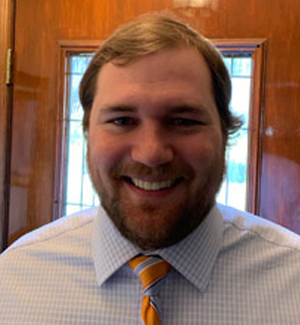 Fowler-Marion Award: Bryant Walker
Fowler-Marion Award: Bryant Walker
The Fowler Marion Award acknowledges the graduate student who has excelled in scholarship, research, and departmental citizenship.
Bryant’s research has focused on how E. coli cell division apparatus, the Z-ring, assembles. In particular, he has been interested in the first steps of the assembly process. This is a highly conserved process in almost all bacteria, many species of archea and plant plastids. This process is a target for existing antibiotics and potential target for new ones. Bryant’s research has made significant progress in mechanistic understanding of this complex multi-scale process. Main results from his work were published in Current Biology this January. Bryant has also been actively involved in training undergraduate students in the lab. In the past two years he has supervised a team of four undergraduate students from the VolsTeach program in their research methods course in the Männik Laboratory. In this semester-long course he met with the students several times per week. During these meetings he taught them how to set up a measurement, collect data, analyze the data, and prepare results for poster presentation.
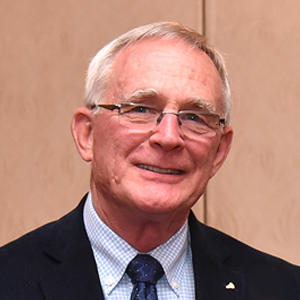 Society of Physics Students Teacher of the Year Award:
Society of Physics Students Teacher of the Year Award:
Professor Stuart Elston
This honor goes to an outstanding professor as selected by the undergraduate students.
From Society of Physics Students President Lucas McClure: "(Professor Elston) taught intro physics to many of us, including myself. During that class sequence (PHYS 135-36), he made sure each student had a chance to ask questions, and he consistently made his best efforts to ensure we all understood the material through hosting review sessions, holding office hours, and being highly-responsive to e-mails. He had a noticeable devotion to the undergraduate program, both as an undergraduate adviser and as a professor for some of the undergraduate courses. He has also been extremely supportive of and involved with our SPS chapter, having even participated in a virtual Facul-Tea time. I also remember first hearing about (and being encouraged to join) SPS in his PHYS 135 class, so this support and involvement has been longstanding." Professor Elston also won the Teacher of the Year Award in 2002.
Learn more about the names behind our awards, as well as previous awardees.
The Chancellor's Honors, another spring tradition for the university, was virtual this year, but the physics department was well-represented with these campus-wide awards.
Extraordinary Professional Promise honors are awarded to undergraduate and graduate students who demonstrate professional promise in teaching, research, or other contributions. Physics students recognized were:
- Josh Barrow
- Xingfu Du
- Charles Hughes
- Nitin Kaushal
- Christal Martin
- Kyle Noordhoek
- Jack Roberts
- Benjamin Smith
- Bryant Walker
- Xin Wen
- Junyi Yang
Extraordinary Academic Achievement honors are awarded to undergraduates who exhibit extraordinary scholarship. Physics students recognized were:
- David Pochik
- Jack Roberts
Professional Promise in Research and Creative Achievement
Research and Creative Achievement—Professional Promise Awards honor faculty members who are early in their careers for excellence in research, scholarship, and creative achievement. Steven Johnston, assistant professor, was among this year's honorees. He studies the properties of novel quantum materials using state-of-the-art computational methods.